More end-of-year award lists are announced, including honors for novels for middle grade and young adult authors Chris Crowe, Martine Leavitt, Valynne Maetani, and Jennifer A. Nielson. Melissa Leilani Larson and Garrett Batty won the Ghana Movie Award for Best Screenplay for Freetown, and Single Wide, by Jordan Kamalu and George D. Nelson, was named one of “The 10 Best Broadway Shows of 2015”. There were Salt Lake Tribune feature articles about Rick Walton and Tim Slover. There will be a reading of Slover’s Shakespearean March Tale on January 22-23. Several authors are using the Kindle Scout program to get their books published. The AML Award finalists will be announced around February 2, and the Whitney Award finalists will be announced on February 9. The Life, the Universe, and Everything symposium on Science Fiction and Fantasy will be held Feb. 11-13. Please send any news or corrections to mormonlit AT gmail DOT com.
Awards
The AML Awards, finalists, including awards for comics, creative non-fiction, criticism, drama, film, middle grade novel, music lyrics, novel, picture book, poetry, religious non-fiction, short fiction, and young adult novel, will be announced on this blog around Feb. 2. The award winners will be announced at the AML Conference at BYU-Hawaii on March 5.
The Whitney Awards finalists, for fiction, will be announced on Feb. 9. The final winners will be announced at the Whitney Award Gala on May 7.
YALSA 2016 Best Fiction for Young Adults. The 64 books on the list includes Chris Crowe’s Death Coming Up the Hill (a 2015 AML and Whitney Award winner) and Martine Leavitt’s 2016 novel Calvin.
Valynne E. Maetani won the Asian Pacific American Library Association (APALA) Young Adult Novel Honor Award (like a 2nd place) for Ink and Ashes. “Ink and Ashes was very interesting and different than what we had read. It was contemporary, but yet the readers will learn a lot about the Japanese histories and superstitions through Claire and her research into her family history which contains links to the Yakuza – the Japanese Mafia. With suspense, mystery, and a dash of romance, this book has teen appeal and would be suitable for a movie adaptation.”
Melissa Leilani Larson and Garrett Batty won the Ghana Movie Award for Best Screenplay for their work on the missionary drama Freetown. They won the award over Cary Fukunaga (True Detective), who wrote the screenplay for Beasts of No Nation, the highly regarded Netflix movie about child soldiers. Freetown was also nominated for best film, but lost to Beasts of No Nation.
A Night Divided by Jennifer A. Nielson was named as one of 10 finalists for the 2015 Nerdies award, a Middle Grade fiction award run by the “Nerdy Book Club” website.
r/Fantasy 2015 (a Reddit site) announced The Stabby Awards. Best Novel of 2015 Shadows of Self by Brandon Sanderson. Best Short Fiction of 2015 Perfect State by Brandon Sanderson. Best Related Work of 2015. Writing Excuses podcast.
2015 Bram Stoker Awards Preliminary Ballot, by the Horror Writers Association, were announced. There were ten to twelve works on each ballot. Superior Achievement in a Novel: Collings, Michaelbrent – The Deep (self-published). Superior Achievement in a First Novel: Alameda, Courtney – Shutter (Feiwel & Friends). Superior Achievement in a Young Adult Novel: Collings, Michaelbrent – The Ridealong (self-published). Superior Achievement in Long Fiction: Yardley, Mercedes M. – Little Dead Red (Grimm Mistresses) (Ragnarok Publications).
News
A Salt Lake Tribune feature story about children’s author Rick Walton. “Utah children’s authors credit publishing boom not to Mormonism but to one man’s insistence they never quit.” The article discusses Walton’s influence and recent struggle with a brain tumor. Authors Jennifer A. Nielsen, Shannon Hale, Amy Finnegan, Mette Ivie Harrison, Carol Lynch Williams, Jessica Day George, and Chris Crowe are quoted in the book.
Several Mormon authors have put up their books for nomination for the Kindle Scout program recently. “Kindle Scout is reader-powered publishing for new, never-before-published books. It’s a place where readers help decide if a book gets published. Selected books will be published by Kindle Press and receive 5-year renewable terms, a $1,500 advance, 50% eBook royalty rate, easy rights reversions and featured Amazon marketing.”
Among the books that have been accepted for publication are:
Jane Redd (Heather B. Moore). Solstice. February.
Rachelle J. Christensen. The Soldier’s Bride. Forthcoming.
Janette Rallison. The Girl Who Heard Demons. Forthcoming.
Books that are currently under consideration (you can vote for them) are:
Brandon Gray (Braden Bell). Orison.
Elana Johnson. Echoes of Silence.
Steven Nielson. Two Runs of Stone.
Julie Wright. Death Thieves.
Michael D. Young. Wandaful.
The 7th Annual Book Cover Contest is going on this week at New LDS Fiction. Go an vote for your favorites.
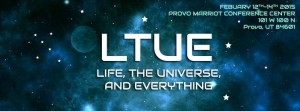 The Life, the Universe, and Everything symposium on Science Fiction and Fantasy will be held Feb. 11-13, at the Provo Marriott Hotel and Conference Center. “LTUE is a three-day academic symposium on all aspects of science fiction and fantasy. Comprised of panels, presentations and papers on writing, art, literature, film, gaming and other facets of speculative fiction, LTUE is a place to learn all about life, the universe, and everything else you love.” Here is the schedule.
The Life, the Universe, and Everything symposium on Science Fiction and Fantasy will be held Feb. 11-13, at the Provo Marriott Hotel and Conference Center. “LTUE is a three-day academic symposium on all aspects of science fiction and fantasy. Comprised of panels, presentations and papers on writing, art, literature, film, gaming and other facets of speculative fiction, LTUE is a place to learn all about life, the universe, and everything else you love.” Here is the schedule.
January 2015 issue of Segullah is now available. The contents include a winter warming poem by Karen Kelsay. In Rena Louise-Smithey’s short, lyric essay, “Smile and Nod,” the narrator, in an unfamiliar environment, sees herself reflected in a stranger and makes an unexpected connection. Saundra Hall, in “Redeemed Vessel,” relates from a teenager’s perspective the heartbreaking challenge of witnessing her parents’ marriage fall apart.
At A Motely Vision; Sarah Dunster, “Karamesines’ Pictograph Murders, and the Dilemma of LDS Literary Fiction Writers”, on the question of the low sales for Mormon literary fiction.
“Gay author shares experiences, anger about Mormon church.” Las Vegas Review-Journal. “Local author Jed A. Bryan is another gay Mormon writer who re-emerged in 2012 after more than two decades of silence with the novel “Companions (Nich’ooni)” (re-released in 2014). He followed it with a sequel, “The Long Waltz,” last year . . . Bryan’s novel “Companions,” or in the Navajo language, “Nich’ooni,” tells the often humorous story of closeted gay Mormon missionary Johnny McKay and his love-hate relationship with his missionary companion, American Indian Jeff Rama, as the two proselytize in the Navajo Nation of northern Arizona. The sequel “The Long Waltz” follows Johnny and Jeff after they have been outed, as they continue their journey as life companions.”
In Memoriam
Robert M. Cundick, organist at the Salt Lake Tabernacle from 1965 to 1991 and a prominent composer, died on Jan. 5 at his Salt Lake City home of causes incident to age. He was 89. Salt Lake Tribune obituary.
 “Bob Cundick in New York” is an essay Glen Nelson on his experiences with Cundick. “I am left with a high opinion of his ability to blur sacred music and concert music. If you study his sonatas, for example, you’ll see that the melodies will later be quoted directly in his great oratorio, The Redeemer. I question whether he saw the music in the sonata and the oratorio as being distinct at all. Both, I suspect, he viewed as deeply-personal expressions. In that plainest way, the violin—to give one example—“sings,” “Behold, I am Jesus Christ.” Same melody, different work. He seemed to be saying, sonatas are sacred, too. Bob Cundick was successful getting his music recorded, but less successful at getting a new generation of musicians, Church administrators, and audiences to hear his work. That needs to be remedied. Some of his music, to my knowledge, hasn’t been played for years and years. It deserves better. I’m aware of 110 compositions by Cundick. They include musicals, oratorios, chamber music, art songs, hymns, choral works, music for orchestra, a few hymn arrangements and some, but not as many as you’d imagine, organ compositions. He was a marvelous man. I loved him, and he was very kind to me, personally—generous, interesting, engaged, curious, ambitious, committed, and ceaselessly loving. He will be missed. Will his music be missed? Well, that’s kind of up to you.”
“Bob Cundick in New York” is an essay Glen Nelson on his experiences with Cundick. “I am left with a high opinion of his ability to blur sacred music and concert music. If you study his sonatas, for example, you’ll see that the melodies will later be quoted directly in his great oratorio, The Redeemer. I question whether he saw the music in the sonata and the oratorio as being distinct at all. Both, I suspect, he viewed as deeply-personal expressions. In that plainest way, the violin—to give one example—“sings,” “Behold, I am Jesus Christ.” Same melody, different work. He seemed to be saying, sonatas are sacred, too. Bob Cundick was successful getting his music recorded, but less successful at getting a new generation of musicians, Church administrators, and audiences to hear his work. That needs to be remedied. Some of his music, to my knowledge, hasn’t been played for years and years. It deserves better. I’m aware of 110 compositions by Cundick. They include musicals, oratorios, chamber music, art songs, hymns, choral works, music for orchestra, a few hymn arrangements and some, but not as many as you’d imagine, organ compositions. He was a marvelous man. I loved him, and he was very kind to me, personally—generous, interesting, engaged, curious, ambitious, committed, and ceaselessly loving. He will be missed. Will his music be missed? Well, that’s kind of up to you.”
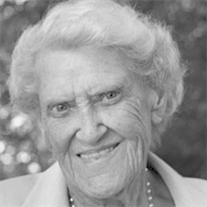 Shirley Paxman, passed away on Dec. 17, at the age of 96. The Provo resident had been a long time supporter of the arts in Utah, including Mormon artists, as well has historical preservation. She served on the boards of many cultural institutions, and was known to attend nearly every AML conference, LDS play, and movie that appeared in Utah. She gave a paper at the 1995 AML Conference: “Where Nothing Is Long Ago: Memories of Virginia Sorensen Waugh” Tributes can be found here and here.
Shirley Paxman, passed away on Dec. 17, at the age of 96. The Provo resident had been a long time supporter of the arts in Utah, including Mormon artists, as well has historical preservation. She served on the boards of many cultural institutions, and was known to attend nearly every AML conference, LDS play, and movie that appeared in Utah. She gave a paper at the 1995 AML Conference: “Where Nothing Is Long Ago: Memories of Virginia Sorensen Waugh” Tributes can be found here and here.
Theater
Single Wide, by Jordan Kamalu and George D. Nelson, was named one of “The 10 Best Broadway Shows of 2015”, by Irvin K. at Hypable. “The NY Musical Theatre Festival always delivers one or two outstanding shows, but rarely the expected ones. A musical about a single mom in a trailer park was nowhere near the top of our most-anticipated NYMF shows list. But the show was a revelation, an incredibly sweet and sincere story. Smashing through the Bechdel test, Single Wide was really feminist, focused on family and friendship over romance – all accompanied by beautiful music. We really hope this musical finds a life after NYMF!”
Tim Slover. March Tale. Pioneer Theatre workshop, Salt Lake City. Readings on Friday, Jan. 22, 8 p.m., and Saturday, Jan. 23, 2 and 8 p.m. The play, about the personal life of Shakespeare, debuted in 1995, and won the AML Drama award.
Slover’s work is discussed in this Salt Lake Tribune feature story. “He writes historical plays, Slover jokes with the quick and self-deprecating wit he’s known for, because he had such a mundane and “blandly happy” childhood. “I have no family stories that are worth telling,” he says, explaining how he seeks historical moments that resonate with the present. “I really do have to go to other places to find stories.” Most recently, Slover felt the heat of the national spotlight as one of three Utah theater artists selected as part of Oregon Shakespeare Festival’s “Play on!,” a provocative three-year project to “translate” the Shakespeare canon into contemporary language. “It’s a very difficult thing to write a period play, and Tim’s natural dexterity with language and understanding of structure make ‘March Tale’ a must-see,” says Ivers, co-artistic director of USF, who will direct the PTC workshop and reading. “And it’s quite funny.” . . . On a friend’s suggestion, Slover sent the script to a Hollywood producer. Several years later, that producer was credited for working on 1998’s “Shakespeare in Love,” which might be perceived to share some plot similarities. He might have a case, an entertainment lawyer suggested, but it would be difficult for an unknown Utah playwright to win a lawsuit.”
The Microburst Theatre Festival was held Jan 13-16 at BYU. 13 short plays were chosen, 10 by students, and 3 by adjunct faculty. The plays, all directed by Rodger Sorensen, each had a running time of between 3 to 11 minutes. They were, “RECOMPENSE,” Kiersten Carr, “A BLOSSOM TREE,” Ting-Chun Chang, “A DRAMATURGE’S TALE,” Rick Curtiss, “BYU TIME EXPERIENCE,” Daniel Fifield, “TIME IN THE ATTIC,” Jessica Fluegel, “TIME LAPSE,” Keith Grover, “KEEPING CLOCKS,” Marianne Hales Harding, “BABY STEPS,” Hadley Holyoak, “POSSIBILITIES,” Teresa Love, “SALVO,” Cristin Lunt, “FREEZE,” Kristen Perkins, “DING,” Janine Sobeck, “TIME CRIMES,” Brad Witbeck.
The Utah Theater Bloggers Association did a round-up of the best Utah theater of the year. Morag Shepherd wrote, “My favorite show of the year, hands down, was Plan-B Theatre Company’s A/Version of Events. In my review I stated, “Playwright Matthew Ivan Bennett takes his audience on a road trip, a trip that is about so much more than just getting somewhere. . . . The directing of this play is simple and profound. There isn’t a heavy concept that gets in the way of the beautiful and poignant dialogue and acting, but rather pointers that signified the imagery and themes of this work.””
“BYU theatre professor finds ways to share truth and testimony”. BYU Universe feature story on George Nelson. “BYU theatre and media arts professor George Nelson is striving to make a difference with theater. Nelson has written three musicals and 10 plays during his time as an actor and a playwright. His musical, Single Wide, received acclaim in New York. He has also participated in numerous shows and taught lectures on the power of educational theater. Nelson said the real power of theater comes through the opportunity to create and present universal truths and bear his testimony to others . . . In 2012, BYU student Ariel Mitchell won the National Student Playwright Award for her play “Second Birth.” The play was later published. In 2013 the program received more acclaim as seven students were honored with national awards for their original new plays in the Microburst Theater Festival performance. The performance also won three national awards from the Kennedy Center. Nelson’s musical, “Single Wide”, received the National New Musical Award in 2015. The musical was written with the help of BYU student, Jordan Kamalu, who also was honored.”
Short fiction
Ryan Shoemaker. “The Honest Adjunct”. Defenestration Magazine. Short-short humor story. See what happens when an adjunct writing instructor speaks his mind to a privileged young student.
New books and their reviews
Nancy Campbell Allen. My Fair Gentleman. Shadow Mountain, Jan. 5. Regency romance. Proper Romance series.
Publishers Weekly: “Fans of sweet Regencies will enjoy this fun romance, in which proper lady Ivy Carlisle plays Professor Higgins to merchant sailor Jack Elliot’s Eliza. Jack needs to enter high society as John Weldon Elliot, the new Earl of Stansworth. He’s the old earl’s legitimate grandson, newly reinstated into the family at the earl’s dying request, but he knows nothing about being a gentleman. While Jack wants to reject the title and high society, he wants a better life for his sister, Sophia, and their mother, so he needs Ivy to teach him how to speak properly, dress, and carry himself. Despite a reputation for circumspect behavior, Ivy is no demure Regency debutante. Her independent streak comes in handy when someone tries to kill Jack, as well as when they face the challenges of setting up a halfway house for prostitutes. Her desire to make a difference infuses the story with excitement and action. Despite social restrictions, Ivy, Jack, and Sophia forge strong friendships and figure out ways to do good with the power and money behind Jack’s title, while avoiding the endless cycle of vapid gossip, petty jealousies, and idle pursuits. Pygmalion stories are common in the genre; this is one of the better ones.”
Mindy, LDSWBR. 5 stars. “I absolutely adored this book. It was a joy from start to finish. I loved all of it. Nancy did an incredible job with writing her characters. All them stood out to me and I longed for each of them to be in the story more. I especially enjoyed how the story started and ended with the same character . . . I honestly can’t say enough about the awesome book. The pages wouldn’t turn fast enough. When I reached the end, I was wanting more.”
Laura Andersen. The Virgin’s Daughter. Ballentine, May 26. Alternative historical. Tudor Legacy #1. Continuation of the alternative history of the English royal family, started with The Boylen Trilogy. Elizabeth I takes the throne, and has a daughter.
The Roanoke Times. “Readers who enjoyed the Boleyn Trilogy will enjoy this first of Andersen’s Tudor Legacy series. It’s in the same style as the first series and balances action and plot with emotion and character development. This second generation of Courtenays and Tudors is more nuanced than the first, though Elizabeth is fabulously drawn — a woman who loves her daughter and her country, but who is naturally more regal than maternal. The last few chapters of “The Virgin’s Daughter” are thrilling as Lucie’s gambit pushes everyone closer to danger than ever before, and the ending is a neatly done setup for the next book, “The Virgin’s Spy,” due out later this year.”
Laura Andersen. The Virgin’s Spy. Ballentine, Nov. 10. Alternative historical. Tudor Legacy #2.
Hikari Loftus, Deseret News. “For lovers of historical fiction, Andersen’s “what if” views of various historical stories offer a refreshing and fun take. Straying from certain historical facts to create “twisted history” can be thought-provoking and add an element of mystery for those familiar with the Tudor history. While “The Virgin’s Spy” has a bit of a slow start, things quickly pick up into what becomes a real page-turning read. Andersen moves effortlessly between the thoughts and points of view of each of her characters, creating distinctive voices for each of them. With several intricate storylines and plot points built up in “The Virgin’s Spy,” readers and fans of this series will highly anticipate the final book.”
Tory C. Anderson. Jacob and Lace. Self, Nov. 2. YA. Tory was a Mormon literary fiction tastemaker in the mid-1990s, when he edited a journal called Wasatch Review International. It is good to see him publishing again.
“Things haven’t been the same for Jacob since his mother quit talking, eating, and getting out of bed. He is confused one morning when she wakes him with the words, “We’re leaving.” Jacob finds himself on a journey to a small town from his mother’s childhood where she hopes he will find safety before she dies. In a new town, a new school, and with a mother losing her battle with depression Jacob’s life is turned upside-down. Lace, the social outcast from Jacob’s homeroom, adds to the confusion with her uncanny way of appearing out of shadows and disappearing up blind alleys. She pushes her way, unwelcome, into Jacob’s life. Lace may hold the key to saving Jacob’s mother, but can he accept the cost?”
Julie Coulter Bellon. The Captive. Stone Hall Books, Dec. 15. Suspense. Griffin Task Force Series #1. It begins with former Navy SEAL being appointed to lead a task force of Americans and Canadians assigned to rescue a kidnapped American diplomat and his translator. Assisting the task force is the daughter of an Algerian hostage negotiator, who has a few secrets and plans she has no intention of sharing with the team. The story begins in Washington D.C. then transports the team to Algeria.
Jennie Hansen, Meridian Magazine. 4 stars. “This is a story that reads like today’s headlines and takes the reader into the armpit of the middle east. It paints a vivid description of the terrain, the seeming mixtures of time periods, and the violence masquerading as religious fervor that dominates the area. Each of the characters has a distinct personality and characteristics, none of which is especially endearing. They’re tough people doing a tough job. Jake is aloof and on the bossy side. Mya is secretive and somewhat sneaky. The other characters are also mostly loners as well, driven by their missions more than relationships. Some of the characters appeared in earlier Bellon books and some references to incidents or people that occurred earlier are a little confusing. The plot is strong and dynamic. Readers won’t want to set this one down. The ending satisfies the questions raised by the immediate plot, but leaves the door open for the next volume in the series.”
Rachel Branton (Rachel Ann Nunes) House Without Lies. White Star Press, Jan. 12. Romance. Romance between two people who want to help troubled teens, and provide a safe home for foster children.
Kristen Carson. The Boxford Stories. Ribbon Wand (self), Nov. 2014. Connected stories. (I just found out about this book.) “Welcome to the world of the Runyons and the Feldsteds, two Mormon families in 1970s Maryland. Far from their Western American roots, they cling to each other like exiles clutching a precious box of topsoil from the old country.” One of the stories, “Atta Boy”, won the 2006 AML short story award.
Kirkus: “In this debut collection of short stories, Carson explores the daily lives, loves and frustrations of two tight-knit Mormon families in 1970s Maryland . . . Standouts include “Gypsy Holiday,” in which Ada’s anxiety over family friends not coming to Thanksgiving devolves into a stark admission of her loneliness and inability to connect with outsiders; “A Little Five-Minute Thrown-Together Something,” which lays bare the squirming insecurities of teenage crushes; and “Flirting Lessons,” which sees Ada’s teenage daughter, Ginni, taking a cross-country road trip with two friends that leads to panic when one goes missing. These stories are unexpected in their subtlety as they explore the reality of what it means to be Mormon—and human . . . A memorable collection that, although occasionally predictable, sheds light on a little-explored section of America.”
Ranee S. Clark. Double Play. Covenant, Jan. 4. Contemporary romance.
Mindy, LDSWBR. 4 stars. “I enjoyed each character’s realizations and growth. This book is charming, fun and the romantic tension between the two was very well written.”
D. J. Erfert. Window of Time. Stone Horse Press, Jan. 4. Fantasy suspense. “CIA courier Lucy James never gets used to seeing innocent people killed, but she copes with it—every day. Cursed with the ability to glimpse into the future when a death is about to happen, she has a short window of time to interfere—risking her life in order to change it. No one knows about her curse, until she saves a handsome Los Angeles firefighter trapped between her and foreign operatives hell-bent on intercepting her current assignment.”
Jared Garrett Lakhoni. Future House Publishing, January 11. Fantasy adventure. “A rescue adventure in a world reminiscent of Aztec culture.”
Jennie Hansen, K. C. Grant, Aubrey Mace. Three Little Words. Covenant, Jan. 1. Contemporary romance short stories.
Jenni James. Jane and Bingley. Trifecta Books, Dec. 23. Austen in Love #2, Countdown to Christmas Book 8.
David Powers King. The Undead Road. Dashboard Books, Jan. 2. Zombie horror. My Zombie Summer, #1. Nothing brings the family together like a zombie apocalypse … Fifteen-year-old Jeremy Barnes would rather watch a zombie movie than shoot a real one, but he has no choice if his family wants to survive the end of the world. Their plan? Drive across the infected United States to a cabin in the Colorado Rockies without a scratch, but their trip takes a complicated detour in the middle of Nebraska when they find Kaylynn, a girl who can handle a baseball bat better than Jeremy can hold a .45 Beretta.”
Sara B. Larson. Endure. Scholastic, Dec. 29. YA fantasy. Defy #3. Conclusion. Deseret News feature story.
VOYA: “Fans of Larson’s Defy series do not have to wait any longer to know if and how Alexa and Damian will remain together in a tumultuous battle involving sorcery, war, and a test of their love. With darker elements than the first two novels, the finale delivers a heavy dose of action, including character deaths that increase the stakes while Alexa, who is still under the control of Dansiian Rafe, works to rescue Rylan. The bloodshed and dark magic are tempered with the romantic elements of Alexa and Damian’s relationship, which has carried the books forward. The romance borders on saccharine, however, when compared with Alexa’s narrative of the threats to her life that “if I didn’t escape, he was going to have The Summoner bleed me to death to try to ensure his victory.” Her heroism captures readers after Damian narrates a sentimental prologue and, incidentally, provides an equally syrupy epilogue for Alexa and his story: creating a charming arc of which Larson can be proud. The series is a must-have trilogy for readers who like fantasy and romance, royal drama, and a side of bloodshed.”
SLJ: “Although the novel’s pacing is sometimes slow, it doesn’t affect the story’s overall appeal. The main characters develop well over the course of the narrative, and the themes of love and loyalty are well woven throughout. Larson creates a dynamic female protagonist in Alexa. She is independent and strong, a protector and rescuer. Fans will be very satisfied with this final journey.”
Kirkus: “This trilogy conclusion sends a girl warrior all over fantasyland, a trail of bodies behind her. Alas, the shoddy worldbuilding and B-movie plotting of the first two books carry over here . . . A deus ex machina conclusion leaves all that sacrifice seeming sadly pointless. Aspires to paint-by-numbers quest fantasy but falls short even of that.”
Melanie Mason. The Ring of Remaliha. Walnut Springs, Sept. 10. Suspense. An Egyptologist tries to decipher an ancient ring, and finds herself dodging thieves and assassins.
Brittany Long Olsen. Dendo. Self, Nov. 5. Graphic novel missionary diary. Olsen served as a missionary in Tokyo in 2012-2013. She kept a daily illustrated journal, which formed the basis of this story in daily diary form. Daily Universe feature. LDS Living feature.
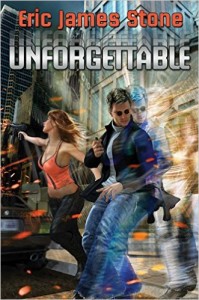 Eric James Stone. Unforgettable. Baen, Jan. 5. Science fiction. First novel.
Eric James Stone. Unforgettable. Baen, Jan. 5. Science fiction. First novel.
Michael Collings, Dialogue. ““That Leviathan Whom Thou Hast Made” (2010) demonstrated Stone’s ability to tell a compelling story incorporating an SF theme—alien/human interaction—with equally compelling perspectives on ethics, morality, spirituality, and religion. His novel, Unforgettable, at first feels more focused on the physical, however, in particular on connections between individuals and the fascinating worlds posited by quantum physics . . . Stone handles his material well, successfully integrating characters, their backgrounds, and their increasingly complex relationships; multiple exotic locales; and minutiae of quantum physics. In the end, he transcends clockwork-SF storytelling as his explorations of intriguing scientific possibilities and human realities lead him to a puzzle as fundamental to human existence as the quantum universe is to the (borrowing from Stephen King) macroverse: the essential nature of freedom while creating a good deal of quirky enjoyment along the way. Recommended.”
PW: “Stone’s debut is a neat little high-tech thriller that doesn’t quite live up to its title. Nat Morgan is a CIA agent with a unique gift (or curse): he doesn’t register on his environment. People forget him after a minute, and computers and cameras don’t record his presence. He gets involved with beautiful Russian ex-spy Yelena on an apparently simple mission, and she leads Nat into increasingly complicated adventures. The two of them aid a defecting Iranian physicist in stopping the activation of a self-aware quantum supercomputer, the Prophet, that would not only be able to monitor all possible events but could control the future. Most of the book’s fun is in watching Nat figure out how to use his “talent”—how, for example, did he get the CIA to notice him in the first place? He’s an ingenious and sympathetic hero who earns readers’ goodwill and expectations for a strong ongoing series.”
E. M. Tippetts. My Wicked Half-Sister. Self, Jan. 12. Romantic suspense. Someone Else’s Fairy Tale #4.
Courtney King Walker. Chasing Midnight. Cedar Fort, Jan 12. YA fantasy. Contemporary retelling of Cinderella, a girl wishes she was one of the “lucky ones”. She is magically granted her wish, but she finds out that there are loses that come with the gains.
Mindy, LDSWBR. 4 stars. “I am a huge fan of Courtney’s books and a sucker for a fairytale retelling. Courtney does a fantastic job with this story. Mackenzie is an instantly likable character. Her humor and charm are catching. Oh, the funny lines that go through her head.”
Laura L. Walker. The Matchup. Cedar Fort/Bonneville, Jan. 12. Contemporary romance. A companion novel to Pierced by Love. “The last thing Valerie wants or needs is to work for her childhood tormentor, Gage. But Valerie’s husband just walked out on her and her children. Now she needs a job. Gage, on the other hand, has just taken custody of his four-year-old son and is swamped trying to balance his career, be a daddy, and fix past mistakes. Together they discover that when it comes to the Church and each other, it’s all about second chances.”
Katie Watkins. 4 stars. “Sometimes, topics can be heavy–autism, divorce, inactivity in religion, trust issues, etc, but Ms. Walker tells the story in a way that comes across as hopeful and not depressing. The characters go through a lot of growth throughout their journeys and the result is causing the reader to feel some emotional attachment to them and to cheer them on. I appreciated that some of these harder situations were tackled and done in a very tasteful and encouraging way. I’m learning, as I go through my own life journey, that until you’re actually experiencing a situation, it’s really hard to feel true compassion and to steer away from judging. I loved that the people these characters encountered are real in their reactions and are also learning, therefore, they are not perfect.”
Karey White. Broken Things to Mend. Orange Door Press, Jan. 1. Contemporary Romance. Stand-alone novel which is part of the “Power of the Matchmaker” universe, a multi-author series led by Heather B. Moore.
Pamela Williams. See You in the Morning. Walnut Springs, Dec. 1. General. Final book in the trilogy that started with What Took You So Long. It follows the main couple into their thirties. “The journey unfolds with honesty and humor as John and Lainie deal with parenthood, John’s family’s religious differences, Lainie’s business partnership, and John’s leadership opportunities in his career and the Church. Through it all, the couple’s love for each other deepens and grows, themes of integrity and fidelity emerge, and life becomes a celebration of the eternal nature of marriage and the joys of being alive.” Williams passed away in 2015.
Reviews of older books
Larry Correia. Son of the Black Sword (Michael Collings, Dialogue). “Larry Correia’s action-adventure novels range from military thrillers to urban fantasies to epic high fantasies, often with accurately detailed depictions of modern and imagined weaponry . . . Son is not simply MHI warmed over. It is a story of far greater complexity and nuance, as Correia moves from the initial action-adventure sequence into something meriting the label of “epic fantasy” . . . Correia provides action aplenty: twists and turns—some hideous, some glorious; fascinating characters portraying an extraordinarily wide range of motivations and emotions; devious and divisive plots and counter-plots, and, more than once, counter-counter-plots. The main characters struggle to remain true to core beliefs and at the same time adapt to new circumstances in ways that allow them to sustain their commitments to remaining loyal, to meeting obligations, and to bringing about the greatest good for Lok. Perhaps the most interesting subset of images and ideas relates to religion. Correia never preaches, although readers aware of his backgrounds might recognize occasional familiar phrases, such as the statement near the end that Angruvadal, with Ashok’s aid, “fulfilled the measure of its creation” or the earlier extended metaphor on baptism as symbolic rebirth and a literal new beginning. In Lok, belief in absolutes never wanes, even when their overt manifestations stagnate and become subject to manipulation by evil minds ostensibly committed to them. As Ashok enters more and more fully into the realm of faith, of prophesy, of direct revelation (as it were), Son of the Black Sword gains in power and intensity. And by the final pages, every order of society, from the Grand Inquisitor to the nearly countless masses of casteless, realize that the world as they knew it has passed…and none know what the future will bring. Highly recommended…and be on the lookout for the next installment.”
L. T. Downing. The Pilfered Papers (Scott Hales, Artistic Preaching). “For much of the book, Joseph Smith and Martin Harris are sitting at a table as they translate the Book of Mormon. Moreover, when they are not translating, they are wrapped up in domestic scenes that depend more on the drama of human relationships and character growth than on action . . . Fortunately, Downing makes it work extraordinarily well by creating interesting characters who draw readers into seemingly mundane domestic situations. From the start of the novel, which opens in the office of Professor Charles Anthon, Martin Harris carries the story forward with his deep desire to prove to his wife (and everyone else) that the Book of Mormon manuscript is divinely-inspired and that Joseph Smith has not deceived him or swindled him out of his money. His motivations throughout the book—from his desire to aid Joseph to his desire to convince his wife of the value of Joseph’s work—are complex and real. Downing often gives us insightful glimpses into what may have drawn him to Joseph Smith and caused him to act the way he did throughout the translation process . . . As with Get That Gold!, however, the true value of The Pilfered Papers is the way it dramatizes history and helps young readers get a better sense of what it was like to experience the early days of the Restoration. To create a vivid and accurate picture of the time period, Downing draws on new understandings of the Book of Mormon translation process that will certainly be surprising to readers who are only familiar with the popular and historically inaccurate images of the process that have dominated Church-published materials in the past. For instance, Downing does not shy away from seer stones or hats, but makes ample and natural use of them—possibly for the first time in Mormon historical fiction. In my opinion, this alone is enough to recommend the book to young readers and their parents.”
Richard Paul Evans. The Mistletoe Inn (Kathy Stephenson, Salt Lake Tribune). “A quick read that offers an uplifting, albeit predictable, story for the holidays.”
Joey Franklin. My Wife Wants You To Know I’m Happily Married (Rich Kane, Salt Lake Tribune). “Fourteen personal essays on a variety of topics. In “Grand Theft Auto,” Franklin details a partly true, partly imagined vision of what thieves did with his stolen car, but it’s hard to sympathize when he tells you it was taken because he had left it unlocked with the keys inside. “Working at Wendy’s,” on a fast-food employment gig, would have benefited if he had stopped navel-gazing long enough to write more about his colleague who had just been released from jail on drug charges. In another piece, he writes about his father’s year in jail, but his crime is oddly never revealed. Franklin acknowledges he’s not a journalist, but several essays could have been helped by a journalist’s truth-telling approach. For if he’s too timid to be more open, why should readers care? Essays range from sweet to schmaltzy to saccharine, meaning that Mitch Albom fans should eat this up like literary comfort food.”
Mette Ivie Harrison. His Right Hand (Karen Grigsby Bates, NPR). “Absorbing Mystery Novel Offers A Glimpse Into Mormon Utah”
Mette Ivie Harrison. His Right Hand (Theric Jepson, A Motley Vision). “The Conflicted Review.” “First, I just need to say that something went wrong in the editing/proofing process . . . On the bright side, this novel suffers much less from the over-the-top worldbuilding of its predecessor. One thing about a series of cozies like this that you just have to accept going in is that there will be a statistically unlikely number of murders in the community. Suspend your disbelief before entering and you should be fine. One thing Harrison does well in this respect is she allows the previous violence to leave the community changed, damaged, stressed . . . [The] novel is trying to be The Great Mormon American Transgender Novel (or something) when really that should have been a side issue. Trying to press the transgender issue to the forefront page in and page out gets in the way of the stronger themes under consideration . . . It’s a fine enough mystery, but it’s confused about its deeper purposes. Until those pieces can work together, the Linda Wallheim Mysteries will never quite be the works of fiction they were born to be.”
Mette Ivie Harrison. His Right Hand (Michael Austin) 5 stars. “As she did in The Bishop’s Wife, Mette Harrison takes on several big projects at once in His Right Hand. On one hand, she provides an honest, warts-and-all (but also decency-and-all) portrait of a Mormon ward. As with most modern mysteries, her project is partially anthropological. She writes from the inside of the Utah-Mormon community in a way that makes that community accessible to outsiders. At the same time, both novels try to prod the people inside the Mormon community to behave better . . . I found His Right Hand to be a stronger novel than The Bishop’s Wife (which was also pretty darn good). In the second novel, Harrison creates a tighter mystery, and though there are still substantial subplots, they are clearly subordinated to the primary mystery in ways that they were not in The Bishop’s Wife, which occasionally allowed its subplots to take over. Harrison’s voice is also more certain in His Right Hand–she does not come off as at all apologetic 1) for being a Mormon; or 2) for not believing everything that most Mormons believe and even some thing that have been declared official doctrine by the LDS Church. Both Linda Waldheim and Mette Harrison have become more mature and more confident in their second outing together. I am excited to see where they both go from here.”
Dean Hughes. Home and Away (Anna Cekola, Salt Lake Tribune). “A heartfelt coming-of-age story for those who, like Hughes, believe Christmas is “a time of year that brings out our strongest emotions.” “Home and Away” explores timeless themes through a family struggling to make the best of things, mixed with nostalgic details from Hughes’ birthplace of Ogden. There’s an extra personal touch, too. A key storyline is inspired by a special dress the author bought for his mother one Christmas when he was a teenager in the 1950s.”
Carla Kelly. Doing No Harm (Jessie Christensen). “One of Kelly’s strengths as a writer is her ability to create a detailed historical setting for her book and a fine set of supporting characters that are unique and memorable. This book did not disappoint in either of those aspects; the village where the action takes place really comes to life, and I feel like I learned a lot of new things about early-nineteenth-century Scotland and the plight of the Highlanders. Although the two main characters were also well-written, I didn’t feel like either changed much over the course of the novel. The conflict and story arc of the book were weak compared to some of Kelly’s other books. This book is quite enjoyable, as long as you aren’t looking for major plot twists or gripping romance.”
Josi Kilpack. Lord Fenton’s Folly (Jessie Christensen). “I was a bit underwhelmed by Kilpack’s last historical romance that I read, but this one pleasantly surprised me. Although it employs some standard tropes, like an arranged marriage and two prickly protagonists that have to learn to love each other, it still felt fresh. I liked that the events that brought the couple together took place outside their relationship and forced them to learn how to deal with challenges together. I also enjoyed the way the book alternated focus between each of the two protagonists in a way that actually moved the story forward and felt natural.”
Martine Leavitt. Calvin (Rosalyn Eves) 4 stars. “I loved Calvin’s voice–I liked how Leavitt managed to create a believable boy who clearly questioned the signals his brain sent him, but who never despaired because of it. And I was astonished at how she managed to make a long walk across the ice interesting, suspenseful–and even funny. If the ending was a little underwhelming, well, that’s sort of how life goes a lot of the time. The story was worth it for the sympathetic portrayal of schizophrenia, Susie’s strength, and Calvin’s own beautiful brain. I also ADORED her homages to Calvin and Hobbes. Anyone who’s familiar with the original will appreciate the occasional appearances of Spaceman Skiff, his alien teacher, the transmogrifier, and more.”
Gerald N. Lund. The Storm Descends (Jennie Hansen, Meridian). “The characters in this story are well developed. Readers may want to shake some sense into Hans at times, but he is well portrayed as a young man returning from war with mixed feelings, facing a great deal of loss and ruined ambitions. He is capable of great compassion, but is also sometimes hungry, and at times resentful of all the broken promises that have wiped out his dreams. Emilee is easy to love and admire. The Westlands are a little too good to be true and not as well-developed as the Eckhardts, but their role is not as large in this volume as it may be in future volumes. The story and plot line are compelling, well-researched, and some of Lund’s best writing. I enjoyed the footnotes a great deal and appreciate their placement at the end of each chapter rather than at the end of the book. Though there are references to the Church, the book is not preachy and lets the events and actions of the characters and of the Church speak for themselves. The story simply tells the personal and political struggles of the German people and families immediately following the war and the punitive measures forced on them at the end of the war. The German people were starving and weren’t even allowed to fish in their own waters. It also shows the impact communism, socialism, the murder of the Russian Romanov royal family, and the takeover of Russia by Vladimir Lenin played in leaving a civilized people ready to accept the hope and positive future promised by Hitler. It clarifies how an intelligent, well-educated, but desperate people allowed the rise of an extremist leader who would lead the country into a second world war.”
J. D. Newman. Sandy and the Weird Sisters (Kristie Wilkins, AML). “J.D. Newman captures very well the awkwardness and emotional roller coaster of being a preteen girl. If we are honest with ourselves, we can each see a little of ourselves in Sandy’s character–an awkward kid, uncomfortable in her own skin and wanting so badly to fit in and be special in some way. I could further relate to Sandy’s love of literature and theater and felt Newman had a delightful way of applying both to Sandy’s circumstances. I loved the characters of the three sisters. Each sister was unique in her personality, religion and relationship with Sandy. Each taught her things the others could not simply because of their own personal quirks, struggles and passions. I appreciated that the relationship between the sisters was realistically depicted–they argued, teased, bantered and interacted as normal sisters would, especially those who have lived together for decades. The author portrays perfectly the bond of sisters; they may argue amongst themselves but say a word against any one of them and they prove themselves fiercely loyal to one another . . . I thoroughly enjoyed “Sandy and the Weird Sisters” and highly recommend it to readers age 10 and up. It would make a wonderful book club offering or family reading book. Packed with thought provoking life lessons, I can see hours of delightful discussion between people of varying ages and experiences. This is author J.D. Newman’s debut novel and I highly anticipate many more to come.”
Stephen L. Peck. Evolving Faith: Wanderings of a Mormon Biologist (Ann Cannon, Salt Lake Tribune). “In a style that ranges from the academic to the personal, Peck addresses the often troublesome intersection between science and faith. Along the way he discusses the scientific method, explores the concept of subjectivity, examines the nature of consciousness, advocates for ecological awareness and good stewardship of the Earth’s resources and discusses our very human need for sacred spaces. His conclusion? Faith and science can — and should — inform one another. The second half of Peck’s book, which is decidedly more personal, may be easier for the lay reader to access than the first half. But the entire collection stands as a thoughtful response to the works of thinkers like Richard Dawkins.”
Stephen L. Peck. Wandering Realities: The Mormonish Short Fiction of Steven L. Peck (Jennifer Napier-Pearce, Salt Lake Tribune). “The tales in this imaginative collection of short stories reflect something of a bizarro-world with a Mormon twist: a bishop who shoots the yappy dogs in his neighborhood, an official in the LDS Church of the future who grapples with the question of whether an artificial intelligence can be baptized, a Martian version of Mormonism. Peck divides the stories into two categories: “Other Worlds,” which has a science-fiction and fantasy flavor, and “This World,” in which reality is infused with something quirky or troubling. Engaging and insightful, Peck burrows into the Mormon experience to poke fun at cultural conventions as well as explore deep ethical questions. His sure-footed prose and wide-ranging consciousness add up to an entertaining and thought-provoking read. Familiarity with Mormon culture helps.”
Jennifer Quist. Love Letters of the Angels of Death (Michael Austin) 5 stars. “Love Letters of the Angels of Death is perhaps the most religious and spiritual book I have ever read that does not mention anything about religion or spirituality. Though neither the author nor the characters ever stake out a religious position, a religious perspective pervades the work. Quist sees marriage as sacramental–something that can be consecrated, or made sacred, by association with holy things–one of which is, ironically, is death. But Quist also sees marriage as something potentially eternal–something that can transcend the cold materiality of death that informs so much of the novel’s plot. Jennifer Quist is a rare writer who can make deeply spiritual, and even dramatically sentimental points without ever becoming overbearing or maudlin. The grace of her prose and the irony of her conceits provide a lot of intellectual cover for what is really a sweet and profoundly religious love story. She can do this because she is capable of engaging our minds and our hearts at the same time, but in different ways, so that both are fully engaged and have a stake in how the novel turns out.”
Jennifer Quist. Sistering (Michael Austin) 5 stars. “I loved, loved, loved (loved, loved) this book. In some ways, Sistering appears to be a traditional family comedy about five sisters who share each other’s joys, mourn with each other during times of sorrow, and hide charred bodies together in Latin America. You know, the usual stuff. But, by having each of the five sisters narrate alternate chapters, Jennifer Quist creates a full slate of strong-but-flawed viewpoint characters who turn what might have been a story of either extreme horror or maudlin sentimentality into a masterful black comedy, worthy of the 20th century masters. Highly recommended.”
Karen Rosenbaum. Mothers, Daughters, Sisters, Wives (Julie J. Nichols, AML). “The fourteen stories are grouped into four divisions, each unrelated to the others. But the stories in each division follow the women in a single family, or follow one woman through several episodes. It’s a little like watching a good TV series—the reader’s understanding of and sympathy for the characters in each division grows with each story. We’re sorry to leave them behind for the next batch. Yet each batch is singular and compelling. Certain characters are hard to forget . . . Fast action and high suspense there is not, but profound sympathy for the connections between and within women’s hearts there is in abundance. None of the women is an activist rallying for change in the Church or even for final resolutions in her family, but each of them observes, considers, and comes to her own honest conclusions. We are happy to have known all of them. This is a lovely volume.”
Kelly L. Simmons. The Wives of Billie’s Mountain (Ellen Fagg Weist, Salt Lake Tribune). “This self-published 2014 historical novel about the abandoned second family of a polygamist sparked local attention in November when the writer published a Tribune letter to the editor about the Deseret News’ decision not to publish an ad for the book — presumably because the novel is about polygamy, Simmons says. Advertising censorship isn’t the best reason to seek out the book. Instead, it’s Simmons’ layered, full-bodied character of Mary, a hard-working young girl who runs away from her family rather than accept a polygamist’s proposal. This richly developed story, a fictionalized account based on Simmons’ great-grandmother, offers relevant insight into how institutional changes affect the rank-and-file faithful. But it’s also filled with rich description that makes its early 20th-century setting and people come alive. “In a genre saturated with faux apocalyptic tales of teens in peril, here’s an emotionally wrenching narrative out of U.S. history,” according to the Kirkus reviews . . . While Simmons isn’t a member of The Church of Jesus Christ of Latter-day Saints, she claims deep Mormon roots, including her great-aunt, noted Utah-born writer Virginia Sorenson.”
Carolyn Steele. Soda Springs (Jennie Hansen, Meridian Magazine) 5 stars. “The setting and background surrounding this story are presented as a vital and essential part of the story and are handled superbly. Steele takes a little known aspect of the western migration and a splinter break-off group from the Church of Jesus Christ of Latter-day Saints and shows their motivation, hardships, and mixed feelings without harsh recriminations. She shows a first-hand knowledge of the weather, plants, wildlife, and terrain that controlled so much of life in those early settlement days. She shows too the interdependence of the people and the pleasure of simple experiences and entertainments. History buffs will find much to enjoy in this novel.”
Carol Lynch Williams. Never Said (Bloggin’ ‘bout Books) B-. “Although Williams is a must-read author for me, I don’t adore every one of her books. Some (The Chosen One; Signed, Skye Harper) I do, some I don’t. Never Said belongs in the latter category. Although I enjoyed its format (Annie’s sections are in verse; Sarah’s are in prose), I just didn’t connect all that well with this story. It’s affecting, yes, but it also comes off as heavy-handed and depressing. Plus, the characters just lack something, especially the girls’ parents, who seem unrealistically cold and over-the-top. In the end, I found Never Said compelling enough to finish (it’s a quick, well-written read), but not to earn my undying adoration.”
Film
God Bless the Child. Robert Machoian and Rodrigo Ojeda-Beck, directors. 2015. The independent film was the Winner of the Best Narrative Feature award at the 2015 Atlanta Film Festival.
Filmmaker Magazine: “A naturalistic, quotidian portrait of five children roaming the streets and marshes of Davis, California after their mother skips town. Machoian and Ojeda-Beck capture their characters with both formal remove and striking intimacy, as their interplay suggests the nature of young bodies left to their own devices.”
Davey Morrison Dillard and Bianca Morrison Dillard are expanding Davey’s short play about Adam and Eve into an ongoing webseries about the early romantic awkwardness between the only man and woman on earth. They have set up a crowdfunding account at Patreon.
Bestsellers
Jan. 4, 11, 18, 24
Glenn Beck. The Immortal Nicholas
USA Today: #87, #142, x, x, x (9 weeks)
PW Hardcover: #16, #18, x, x (9 weeks). 15,169, 11,001 units. 117,761 total.
NYT Hardcover: Off after 4 weeks plus 3 weeks on the extended list.
Stephenie Meyer. Twilight: The Life and Death Dual Edition
USA Today: #141, #83, x, x, x (12 weeks)
PW Children’s: #12, #9, #8, #11, #19 (14 weeks). 14,653, 17,373, 6967 units. 259,894 total for 2015. 2016: 3571 units.
Richard Paul Evans. The Mistletoe Inn
USA Today: Off after 5 weeks
PW Hardcover: #20, x, x, x (5 weeks). 11,537 units. 64,542 total.
Christine Feehan. Wild Cat
PW Mass Market: #23, #25, x, x, x (5 weeks). 5882, 4786 units. 43,969 total.
PW Romance: #10
NYT Mass Market: Off after 2 weeks plus 1 on the extended list.
James Dashner. The Maze Runner
USA Today: #161, #95, x, x, x (99 weeks)
James Dashner. The Scorch Trials
USA Today: #158, #118, x, x, x (77 weeks)
James Dashner. The Maze Runner Series
USA Today: #180, #148, x, x, x (20 weeks)
NYT Children’s Series: #4, #4, #7, #8 (170 weeks)
RaeAnn Thayne. Snow Angel Cove (2014 novel)
USA Today: x, #140, x, x, x (6 weeks)
Shannon Hale and Dean Hale. The Princess in Black
NYT Middle Grade Paperback: #6, #6, #7, #7 (22 weeks)

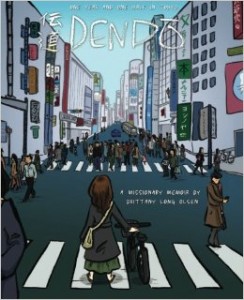
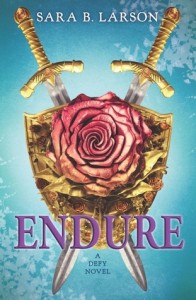
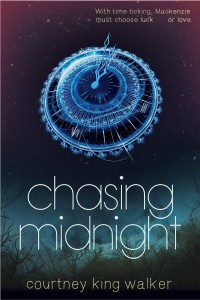
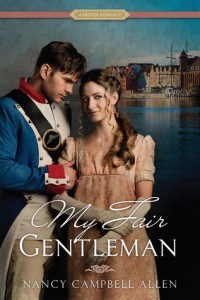
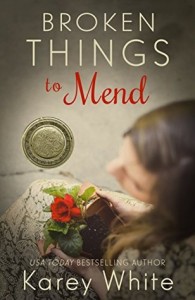
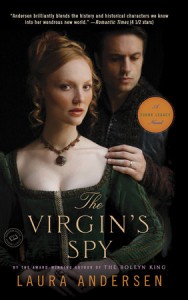
As always, thank you for the time you spend doing this!